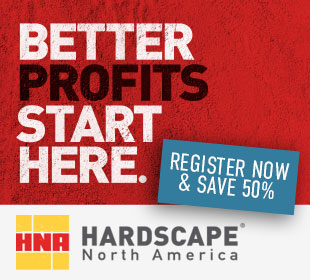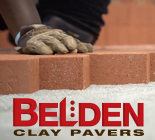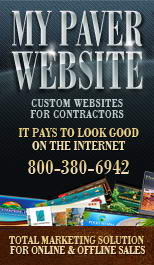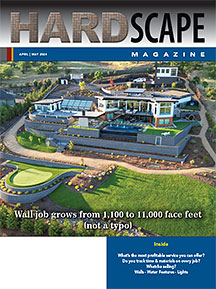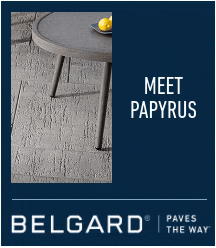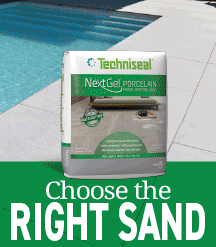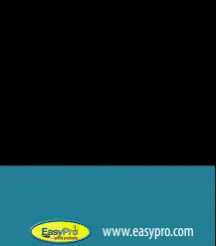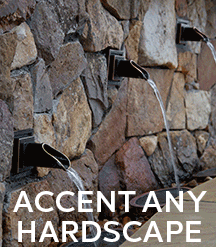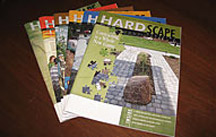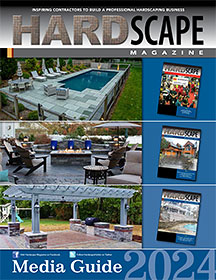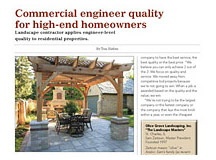Articles written by guest contributors
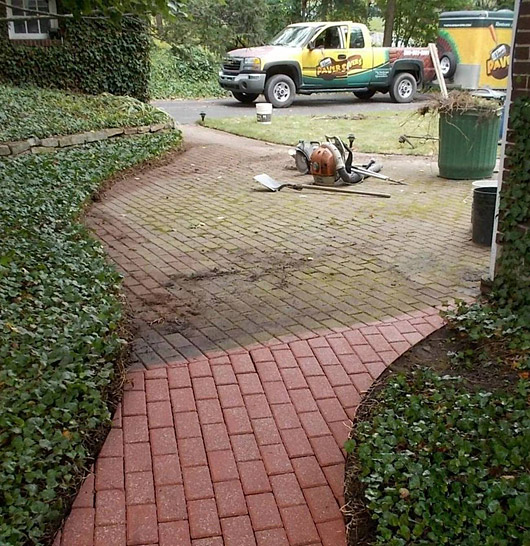
Photos provided by The Paver Savers, a hardscape restoration company serving Lehigh Valley, Poconos and Eastern PA.
Building revenue next season: 4 steps
By Lynn Walsh, Director of Support Services and Jay Krech, Director of Technical Support & Training with SEK-SurebondThere’s a money-making opportunity that complements your business and that many contractors don’t take advantage of – hardscape restoration. Simply put, hardscape restoration is the revitalization of pavers, natural stone and concrete surfaces through minor repairs, cleaning, joint stabilization and sealing.
According to ICPI, over 9 billion square feet of pavers have been installed in the United States since 1998. The overwhelming majority of those 9 billion square feet of pavers has not been sealed. The abundance of dirty and unprotected pavers presents a huge opportunity for growth and additional revenue through hardscape restoration.
There is an increasing demand for companies who specialize in hardscape restoration because so many other contractors shy away from offering these services. Adding hardscape restoration to your business will take some work on the front end, but it’s not as difficult as you think. By starting now, you have plenty of time to go through the steps needed to roll out a hardscape restoration service next spring.
Step 1: Assessing the opportunity
Attending a contractor certification class offered by a cleaning and sealing product supplier is an excellent way to get started. From this class you gain knowledge about cleaning and sealing technology, how to select the proper cleaners and sealers, the restoration process, professional application techniques and selling your services.The biggest initial hurdle is usually getting past a lack of experience using the products. Before launching into clients’ projects, practice on surfaces at home, at your shop and/or on relatives’ and close friends’ projects. Ask your supplier if they know of a sealing contractor an hour or so away that you could work with for a few days to get some experience.
Step 2: Determining your customer base
Your past hardscape customers are great prospects for restoration services. For example, if you’ve been in business 10 years and installed 50 hardscape projects annually, that’s 500 excellent restoration prospects.Network with other service providers and businesses you frequent such as repair shops, equipment distributors, your accountant, banker, etc. Let them know about your new service and what you can do for clients. They have the potential to add additional customers to your list.
On the commercial side, many businesses strive for the high level of “curb appeal” you can provide. Contact hotels, restaurants, office buildings and home associations, to name just a few, as potential customers with a good chance of repeat business in the future.
Finally, reach out to realtors in your area to market your ability to improve the curb appeal of properties they represent. You may never restore the same property again, but you will likely clean and seal additional properties with the same realtor.
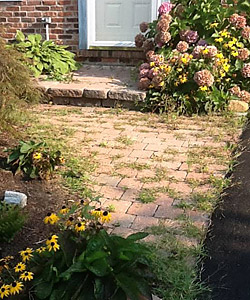
Before
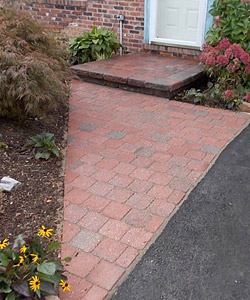
After
Step 3: Equipment, tool & material selection
Here are some basic tools of the trade:Quality pressure washer – As a general rule, an effective pressure washer for paver cleaning will be rated at 3,000 – 3,500 PSI and at least 5 gallons per minute (GPM). Contractors tend to focus too much on PSI. PSI beyond 3,000 doesn’t make near as much difference in cleaning efficiency as it does to have a higher GPM, a greater volume of water per minute.
The higher the GPM, the faster you will be able to clean and the more tools (spray wands and surface cleaners) you’ll be able to run at the same time. Don’t settle for the $300 machine that only puts out 2 or 3 GPM because it is hard to make money at that rate. A 5 GPM washer is much more efficient.
Consider upgrading to a hot pressure washer that easily removes stains and existing water-based sealers. You will not need hot water all the time, so you can rent as needed if you are on a tight budget. You also might want to rent and test-drive a couple of different cold-water units before purchasing.
Flat surface cleaner – A powerful flat surface cleaner (looks like a floor buffer) helps you clean more effectively and efficiently. A 24” cleaner is a common size for beginners. If your jobs have a lot of tight spaces, you might want to go smaller. If you clean large, wide-open commercial projects, you may want a 40” machine. Because surface cleaners cost several hundred dollars, most contractors start out renting.
Sprayer – To cover a lot of ground quickly, get a battery-powered sprayer that pumps for several hours. A battery-powered sprayer might cover 1,000 to 1,500 sf per hour versus a hand-pumped sprayer that might cover only 300-400 sf per hour. Applying sealer with a roller is slower than using a hand-pumped sprayer. We recommend sprayers with a 2 GPM pump and nozzles that are replaceable so you can change them out when different volume is needed or they wear out. If you plan to apply solvent based products you will need a sprayer with solvent tolerant seals (often made with Viton).
Additional tools that you may already have include leaf blowers, brooms, buckets, rags, squeegees and low and high pressure hoses.
Cleaners – your cleaner arsenal should consist of the following:
- Multi-purpose heavy-duty detergent to use over the entire surface.
- Efflorescence cleaner to use over the entire surface as needed.
- Organic stain remover for things like food, acorn, berry and rust stains.
- Oil remover for petroleum products, some food-based oils and grease.
- Sealer stripper to remove existing sealers.
Jointing sands – Select a jointing sand that meets ASTM C144 gradation to provide optimal joint stabilization (See ICPI for further information).
Sealers – You will want to have all of the basic finishes on hand (wet look, satin and matte) to meet the expectations of your customers. Products that dry quickly require a shorter weather window so you don’t have to wait for the perfect day to seal and can complete more projects. If the sealer you have selected does not stabilize joint sand, a polymeric sand should be installed prior to sealing.
Step 4: Marketing & selling your services
In marketing your restoration services, before-and-after photos are important, and you will want to use them in all your marketing efforts. Photos allow prospective clients to visualize the difference your work will make. Your supplier may have photos you can use to get started.Door hangers on neighboring houses may be old school, but they are still highly effective and very inexpensive. The neighbors see your truck and they know your client who will tell them how happy they are with your work.
A variation on the door hanger is the personalized “Dear Neighbor” letter. It takes a little research but you can get neighbors’ names through a reverse directory online. Hand letters out to adjoining property owners and introduce yourself. “We’re sealing pavers at the Jones’ house. Please feel free to come by if you have any questions, comments, concerns.” Leave the letter in the door if no one is home.
We highly recommend getting a vehicle wrap on an enclosed trailer to serve as a mobile billboard. It doesn’t have to cost a lot, but the enclosed trailer with a signage wrap has become the model for the successful restoration contractors we’ve seen around the country.
Selling your services - When it comes to selling and estimating your services, always visit the project. Bring along your portfolio and samples. If during your phone conversation you can determine what pavers the prospect has, bring in sealed samples of that paver to your sales call.
Take “before” photos while on site. If a surface needs spot cleaning, do a small area to determine what’s required to treat it. This also demonstrates your cleaning ability and helps sell your services.
Turning prospects into customers takes work, so look for ways to generate repeat business and referrals. Offer an annual maintenance contract that allows property owners to keep their property looking good all the time. Another approach is to offer an extended warranty on a new hardscape installation with the purchase of an annual hardscape maintenance program. Finally, offer a reward program to past customers for work obtained through their referrals.
By following these 4 easy steps to begin offering hardscape restoration, you will have an opportunity to increase profitability and grow your company next year. Start now by contacting a cleaning and sealing products supplier to find a contractor certification class in your area.
SEK-Surebond is a manufacturer of premium hardscape products including Surebond cleaners and sealers and PolySweep polymeric sand. Their expert team of regional support staff is available to help you grow your business thru hardscape restoration. Call (800) 932-3343 or visit SEK.US.com.
Photos provided by The Paver Savers, a hardscape restoration company serving Lehigh Valley, Poconos and Eastern PA.



